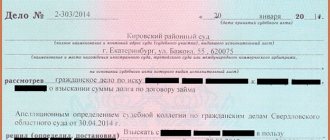Legal basis
In accordance with Art. 392 of the Labor Code of the Russian Federation, the statute of limitations for collecting wages is a certain period, which from mid-2021 is equal to one year (until this point, the general rule of a three-month period for labor disputes was in effect). Thus, in such relationships, labor law norms apply, and the courts, when considering applications, are guided by the general rules established by the Civil Code.
In particular, according to the provisions of the Civil Code, if the statute of limitations has expired, but the defendant has not applied to the court with an application to skip it, the court will consider the case and make a decision.
The procedure for determining the reference date
The legislator does not link the right to file a claim with dismissal: it is allowed to continue working and file a claim. The moment from which the limitation period is counted does not depend on whether the citizen is still working or has quit. The period is provided exactly one year, and it is counted from the moment when the citizen learned about the violation of his right. It remains to be determined how to install it in practice.
After registration of dismissal
Since the employer is obliged to pay all due remuneration on the last day of employment, the starting point should be associated with this date. That is, the limitation period for wages after dismissal begins to run from the date of dismissal, based on Art. 14 Labor Code of the Russian Federation. The article states that the period of time associated with the emergence of the corresponding rights and obligations begins with the calendar date that determines the beginning of the emergence of rights and obligations.
While continuing to work
In this case, we are talking about delays in fees, non-payment on the day specified in the contract, or its discrepancy with the stated amounts. The law does not establish a separate limitation period for non-payment of wages in any of the legislative norms. Thus, based on Art. 392 of the Labor Code, it amounts to a year for each specific episode of non-payment or underpayment. And it is counted from the moment the employee learned of the facts of violation on the part of the employer. This moment is determined:
- date of issue of earnings;
- the date of familiarization with the documents: payslip, additional agreement on the assignment of additional responsibilities after the fact, etc.
Forced collection of wage debts: amendments to the Labor Code of the Russian Federation
Non-payment of wages is a gross violation of the law and always leads to negative consequences. You will learn from the article by Mikhail Makhrov what amendments have tightened the procedure for collecting wage debts from employers and what rules each company must follow.
The right to timely payment of labor is guaranteed to every employee by the norms of the Constitution of the Russian Federation and the Labor Code of the Russian Federation (hereinafter referred to as the Labor Code of the Russian Federation). However, often the employer evades the proper fulfillment of his obligation to pay wages on time, which leads to the formation of debt. Thanks to amendments to the legislation in December 2021, employees have the opportunity to collect such debt in a simplified manner. Let's talk about this in more detail.
About the timing of payment of wages
In accordance with Part 3 of Article 37 of the Constitution of the Russian Federation, everyone has the right to remuneration for work without any discrimination and not lower than the minimum wage established by federal law. Article 21 of the Labor Code of the Russian Federation assigns to each employee the right to timely and full payment of wages in accordance with their qualifications, complexity of work, quantity and quality of work performed. This right corresponds to the employer’s obligation to pay the full amount of wages due to employees within the time limits established in accordance with the Labor Code of the Russian Federation, the collective agreement, internal labor regulations, and employment contracts (Article 22 of the Labor Code of the Russian Federation).
According to Article 136 of the Labor Code of the Russian Federation, salaries must be paid to employees twice a month. Specific dates are determined by the employer and are fixed in local regulations or in the employment contract. The employer should remember that wages must be paid no later than 15 calendar days from the end of the period for which they were accrued. Rostrud recommends paying wages for the first half of the month on a set day from the 16th to the 30th (31st) of the current period (the so-called advance), and for the second half of the month - from the 1st to the 16th of the next month[1]. In this case, the gap between payments should not exceed 15 calendar days[2]. If the salary payment date falls on a weekend or non-working holiday, the amounts due must be paid the day before (Article 136 of the Labor Code of the Russian Federation).
On amendments to the Labor Code of the Russian Federation and the Federal Law “On Enforcement Proceedings”
Methods of collecting “honestly earned money” were previously limited to: 1) an attempt by workers to negotiate with the employer peacefully; 2) by contacting the state labor inspectorate, which could only issue the debtor an order to eliminate the violation and bring him to administrative responsibility by issuing a relatively small fine under Part 6 of Article 5.27 of the Code of Administrative Offenses of the Russian Federation; 3) by the employee going to court, which, although it gave a certain result, required from the employee not only additional costs, but also time.
Last December, two federal laws were adopted that simplify the procedure for collecting wage arrears. Federal Law dated December 2, 2019 No. 393-FZ (hereinafter referred to as Law No. 393-FZ) amended the Labor Code of the Russian Federation, and Law dated December 2, 2019 No. 402-FZ (hereinafter referred to as Law No. 402-FZ) amended the Law “On enforcement proceedings." These laws came into force on December 13, 2019.
Law No. 393-FZ expanded the powers of state labor inspectors, giving them the right to organize and conduct activities aimed at preventing violations of labor legislation and other regulatory legal acts containing labor law norms. Such activities must be carried out in accordance with the program for the prevention of such violations annually approved by the state labor inspectorate. In addition, state inspectors received the legal right to take measures to enforce the employer’s obligation to pay accrued but not paid wages to the employee on time and (or) other payments made within the framework of labor relations (Article 356 of the Labor Code of the Russian Federation). Compulsory execution is carried out on the basis of the decision of the inspector, made in accordance with Article 360.1 of the Labor Code of the Russian Federation (Article 357 of the Labor Code of the Russian Federation).
According to the amendments introduced by Law No. 402-FZ, the decision of the state labor inspector, taken in accordance with Article 360.1 of the Labor Code of the Russian Federation, is classified as enforcement documents (clause 5.1, part 1, article 13 of the Federal Law “On Enforcement Proceedings”, hereinafter referred to as Law No. 229-FZ). In it, in addition to the general information specified in Part 1 of Article 13 of Law No. 229-FZ, it must also indicate the details of the claimant’s bank account and have a note indicating that the decision has been delivered to the employer (Part 1.2 of Article 13 of Law No. 229-FZ). The execution of the decision of the state labor inspector is carried out in accordance with Article 72.2 of Law No. 229-FZ.
The procedure for making a decision of the State Tax Inspectorate on the collection of wage debts
As mentioned above, the procedure for the forced execution of the employer’s obligation to pay accrued but not paid on time wages and other payments is established in Article 360.1 of the Labor Code of the Russian Federation. It consists of the following stages.
- Issuance of an order to eliminate the identified violation of labor legislation. Such an order can be issued to the employer based on the results of both scheduled and unscheduled inspections conducted by the state labor inspectorate. We believe that it can also be issued as part of the activities carried out by the State Labor Inspectorate aimed at preventing violations of labor legislation. In the order, the state inspector is obliged to explain to the employer the procedure for making a decision on forced execution (Part 2 of Article 360.1 of the Labor Code of the Russian Federation). The order is subject to mandatory execution within the period specified therein.
- Conducting an unscheduled inspection to monitor compliance with the order. Carrying out such a check is provided for in paragraph two of part 7 of article 360 of the Labor Code of the Russian Federation. An unscheduled inspection is carried out after the expiration of the deadline for the employer to fulfill the order issued by the State Labor Inspectorate to eliminate the identified violation of the requirements of labor legislation.
- Making a decision on enforcement. The basis for making such a decision is the fact of the employer’s failure to comply with the order of the State Labor Inspectorate to eliminate violations of labor legislation, established during an unscheduled inspection. The decision can be made by the inspector no earlier than the expiration of the period for eliminating the violation specified in the order, and no later than one month after the expiration of this period or no later than one month after the entry into force of a court decision recognizing the order as legal if the employer appeals it to the court.
- Sending the decision to the employer. The state labor inspector is obliged to send the decision to the employer within three working days after the date of its adoption. The decision can be sent either on paper by registered mail with notification, or in the form of an electronic document signed with an enhanced qualified electronic signature.
- Appealing the decision by the employer. If the employer does not agree with the received decision of the State Tax Inspectorate on forced execution, he has the right to appeal this decision to the court. This can be done within 10 days from the date of receipt of the decision.
- Execution of the decision by the employer. Since the decision of the State Tax Inspectorate is subject to mandatory execution, the employer is obliged to comply with it within the prescribed period. Taking into account the provisions of Part 6 of Article 360.1 of the Labor Code of the Russian Federation, the decision must be executed no later than the expiration of the period for appealing the decision, that is, within 10 days from the date of its receipt. If the employer appeals the decision and the court recognizes it as legal, then, in our opinion, the execution period should be calculated from the date the corresponding court decision entered into legal force.
- Sending the decision to the FSSP of Russia. Compulsory execution of the decision of the State Tax Inspectorate with the involvement of bailiffs is carried out in the event that the employer does not comply with the decision of the State Tax Inspectorate voluntarily and the deadline for appealing this decision has expired.
The procedure for executing the decision of the State Tax Inspectorate by a bailiff
Enforcement proceedings based on decisions of the State Tax Inspectorate on the forced execution of the employer’s obligation to pay off wage arrears are initiated by a bailiff in the general manner, taking into account the specifics established by Article 72.2 of Law No. 229-FZ.
These decisions are executed in the following order.
- Initiation of enforcement proceedings. The decision to initiate is issued by the bailiff within three days from the date of receipt of the decision of the State Tax Inspectorate (Part 8 of Article 30 of Law No. 229-FZ). In the resolution, the bailiff sets a deadline for the debtor’s voluntary fulfillment of the requirements contained in the decision, and also warns the debtor about forced execution of the requirements after the expiration of the period for voluntary execution with the collection of an enforcement fee from him (Part 11, Article 30 of Law No. 229-FZ) . The period for voluntary execution is, as a rule, five days and is calculated from the day the debtor receives the decision to initiate enforcement proceedings or from the moment of delivery of the notice of posting information about the initiation of enforcement proceedings in the data bank, sent by sending an SMS message, or other notice or resolution on the initiation of enforcement proceedings, issued in the form of an electronic document and sent to the addressee, including to his single personal account on the Unified Portal of State and Municipal Services (Part 12 of Article 30 of Law No. 229-FZ).
Simultaneously with the issuance of a resolution to initiate enforcement proceedings, the bailiff sends requests to banks and other credit organizations regarding information about the types and numbers of the debtor’s bank accounts, the quantity and flow of funds in rubles and foreign currency (Part 2 of Article 72.2 of Law No. 229 -FZ).
- Forced collection of funds. If the debtor-employer has not fulfilled the requirements contained in the decision of the State Tax Inspectorate within the period for voluntary execution established in the bailiff's resolution to initiate enforcement proceedings, then the bailiff shall issue a resolution to collect funds from the debtor's bank accounts. Such a decision is made after the expiration of the period for voluntary execution and provided that the bailiff has information about the location of the debtor’s accounts in banks and other credit organizations. No later than the day following the day the resolution is issued, the bailiff sends it to the appropriate bank or other credit organization, which is obliged to immediately transfer funds from the debtor’s accounts to the account of the creditor specified in the resolution (Part 3 of Article 72.2 of Law No. 229-FZ ).
- End of enforcement proceedings. According to Part 4 of Article 72.2 of Law No. 229-FZ, enforcement proceedings for the execution of a decision on forced execution ends in two cases:
1) upon the fact of transfer by a bank or other credit organization to the recoverer of funds in full;
2) if, within two months from the date of initiation of enforcement proceedings, there are no funds in the debtor’s accounts sufficient to execute the decision on forced execution, at the expense of which the claims of the claimant can be partially or fully satisfied (Part 4 of Article 72.2 of Law No. 229 -FZ).
On the completion of enforcement proceedings, the bailiff issues a ruling, which is sent in the form of an electronic document to Rostrud (Part 5, Article 72.2 of Law No. 229-FZ).
Summarizing the above, we see that, unlike the judicial procedure, the collection of wage debts based on the decision of the state labor inspector does not require any participation from creditor employees. However, the employer limited the circle of employees who have the right to take advantage of this procedure for collecting salary debts, establishing one exception: this procedure cannot be used by the persons specified in part 4 of Article 349.4 of the Labor Code of the Russian Federation, namely, those holding positions of the sole executive body, its deputies, members of the collegial executive authority, chief accountant, deputy chief accountant of the bank, head and chief accountant of a bank branch, members of the board of directors (supervisory board) of the bank, as well as persons controlling the bank, determined in accordance with bankruptcy legislation (Part 7 of Article 360.1 of the Labor Code of the Russian Federation).
[1] Information from Rostrud “On the application of Article 2 of the Federal Law of July 3, 2021 No. 272-FZ “On amendments to certain legislative acts of the Russian Federation in terms of remuneration”” {ConsultantPlus}.
[2] Question: About salary payment days (Letter of the Ministry of Labor of Russia dated March 12, 2019 No. 14-2/ОOG-1663) {ConsultantPlus}.
What to do if you miss it
The Labor Code of the Russian Federation establishes that the statute of limitations for arrears of wages in exceptional cases is allowed to be restored (extended). But to do this, you will need to prove the presence of good reasons: the legislator associates the possibility of restoration with their presence. And the final decision remains with the court. Please note that there is no provision for a separate appeal of the court’s decision to refuse reinstatement to a higher authority, that is, it can only be appealed against the main court decision.
When is recovery possible?
If there are good reasons:
- disease;
- caring for a seriously ill family member;
- irresistible force;
- business trip -
the court will most likely agree that the statute of limitations should be restored. These facts will have to be proven, and the acceptance of evidence and assessment depend only on the internal conviction of the judge. Thus, the statute of limitations for the collection of wages is a concept associated with legal proceedings.
If the employer does not agree with the court order
If the employer objects to the collection of unpaid wages, does not agree with the court order, he must provide evidence to the contrary.
| Attention! The courts believe that proving the absence of debt is the responsibility of the employer, since the calculation of amounts and execution of settlement documents is his direct responsibility. |
What documents can be presented to the court as evidence:
- statements reflecting the issuance of salaries or payment orders to the bank will prove the fact of the transfer;
- accounting information and payslips will confirm the correctness of the calculation of salary amounts;
- the employment contract, hiring order, regulations on wages and bonuses and other documents contain information about the size and structure of the employee’s salary.
Thus, the employer proves in court that the salary established by the employment agreement was paid on time and in full.
| Advice It should be borne in mind that disputes over delayed wages are often not limited only to the salary amount. According to Article 236 of the Labor Code, an employee has the right to recover compensation for delayed wages, which is calculated as 1/150 of the Central Bank key rate for all days of non-payment. |








